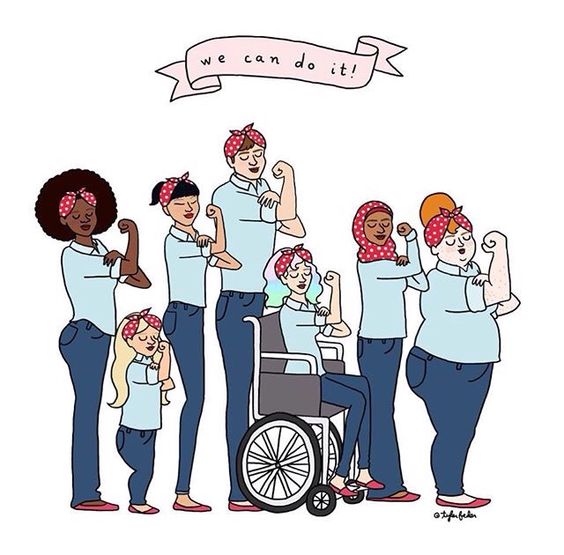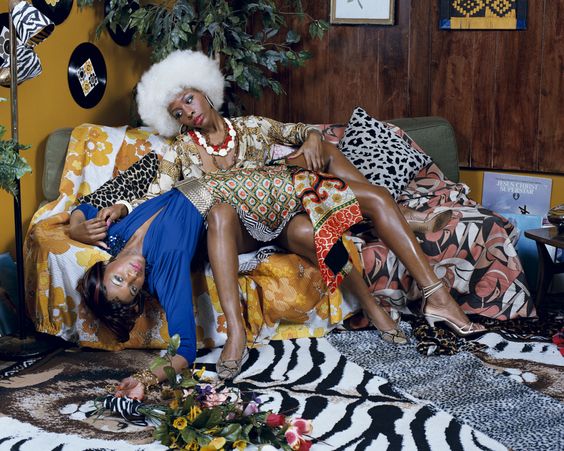
La leçon d’amour, 2008
I first came across Mickalene Thomas’ work on – where else? Pinterest. Because I’m obsessed. Anyway, besides her work being gorgeous and the fact that it focuses on black female identity and sexuality, I was drawn to find out more about her when I discovered that not only is she an openly gay black artist, but she is also from Camden, NJ, where I was born. To top it off, she is now based out of Brooklyn, NY, just as I am.
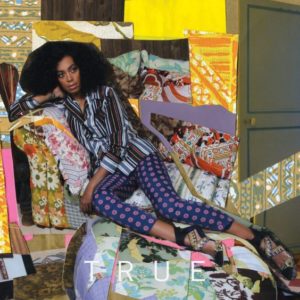
Solange – True (limited edition EP art)
Thomas’ work is a cross between that of Romare Bearden, Henri Matisse’s fauvism, and pop art. She often uses mixed-media, a technique in which she incorporates acrylic paint along with glitter, rhinestones, and other materials. She also utilizes photography and multi-textured collages filled with patterns and bright colors. On her use of patterns, Thomas says in a 2011 interview with PMC Mag that, “Pattern has been an important part of my work for a very long time–I use it to create rhythm and dissonance in the work as well as to reference an array of influences and sources.”
Thomas also creates amazing installations, which are works of three-dimensional creation, often used to transform a space into a representation of a certain concept or theme. Below is Thomas’ “Better Days” installation, which depicts a childhood memory of when her mother hosted parties and other events to raise money to fight causes that affect the Black community.
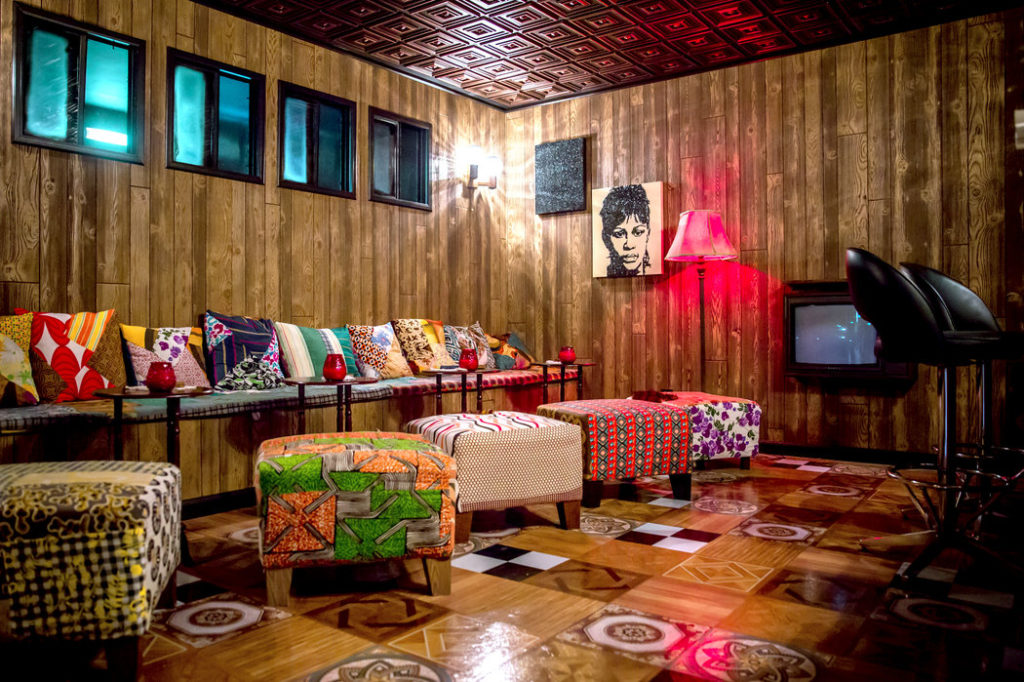
“Better Days” Installation, 2013
Remarkably, Thomas introduces the Black woman into classical art in a beautiful and poignant way. This is especially apparent in her 2012 exhibition, “The Origin of the Universe,” where, as Huffington Post puts it, she “…trad[es] in Romantic renditions of milky skin and auburn curls for glamorous black women, their nude forms replaced with bold, printed ensembles, playful wigs, and electric makeup…Thomas does far more than insert black women into an artistic narrative from which they were, for so long, excluded.” With each new exhibit, Thomas challenges societal norms of beauty and forces the viewer to come face to face with how she perceives it.
Even as her work evolves, Thomas continues to put the Black woman at the forefront as she does with the many-layered tapestries and landscapes that surround them. She is able to achieve the fine balance between a Black woman’s sexuality, strength, and femininity and by doing so she allows her work to exude a certain truth and sincerity that is often lacking in the one-dimensional portrayal of the Black woman.
In a 2016 Women in the World, New York Times interview, when asked how her work is affected by how the black woman’s experience is often erased in the feminist dialogue, Thomas says, “By selecting women of color [as my subjects], I am quite literally raising their visibility and inserting their presence into the conversation. I like to think of the portraits as mirrors… We are not validated until we see ourselves, and the mirror is a tangible object that works as an evidence to external appearance. Not only are we present, we demand that we be seen, be heard, and be acknowledged.”
In an Interview Magazine feature, Thomas specifically speaks about the importance of representing the Black woman when it comes to ideals of beauty. She says, “Out of necessity, black women have always had to consider others’ perceptions of a certain beauty ideal, just starting with the skin color.” This is where her art comes in; it not only validates the Black woman’s existence, it seeks to educate the rest of the world on just how beautiful and precious a Black woman’s skin, hair, and body are and that these are not to be devalued by any outsider who may not understand their worth.
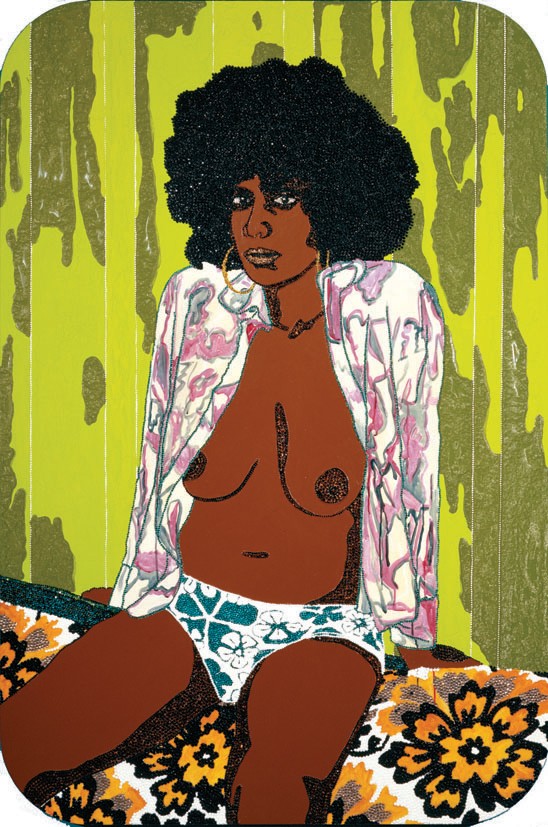
I Thought You Said You Were Leaving, 2006
In total recognition of her intersectionality, Thomas’ art also conveys powerful messages about the female body and women’s sexuality. Thomas’ “Origin of the Universe” is an invocation of Gustave Courbet’s “Origin of the World” (1866), where Courbet painted a headless torso of a woman with her legs spread, leaving everything for full view. With her rendition, Thomas strips the power away from such a male-centered, controversial work and turns it into something much more empowering. She uses herself as the model, spread legs and all, and in her signature style, she incorporates glitter into the portrait. Thomas makes it her own in such a way that seems to exclaim, ‘It is my body and I will allow you to view it when and how I please!’
Thomas is also adept at seamlessly featuring intimacy between Black women in her artwork. Another piece in her exhibition, “Origin of the Universe”, called “Sleep: Deux Femmes Noires” (also an invocation of Courbet’s work), depicts two Black women with limbs intertwined, taking a nap in the midst of a garden full of disjointed colors and shapes.
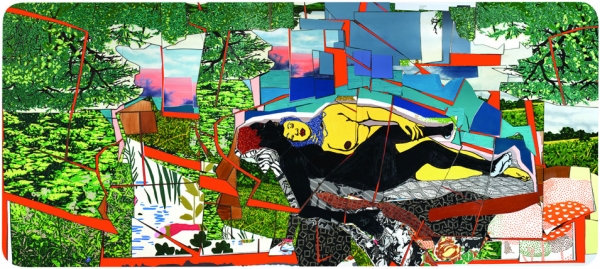
Sleep: Deux Femmes Noires, 2012
Keeping in theme with intimacy between Black women, Thomas is known for using subjects that she has good relationships with, both working and personal. Her most recent work, “Muse”, is based on a book of the same name and is dedicated to her photography of many of the women she works with. The exhibit and book feature several of Thomas’ personal friends and acquaintances with whom she became closer with as she continued to use them as subjects in her pieces. Continue reading →




